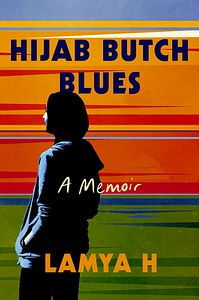Take a photo of a barcode or cover
Maryam is a dyke… There are other women like me in the Quran…who are born wrong…Women who rage, rage to God no less, about wanting to die
This is the world fourteen-year-old me couldn’t even begin to imagine. I’m already here.
Reading about Lamya's journey in discovering her queerness, as well as reconciling her identity and her faith, was a moving experience. It touched upon a lot of important subjects: feeling like you're not fitting in, looking for a community to belong to, feeling lost, coming out, dealing with the immigration system and discrimination, finding something or someone to relate to; and all of it was written in a very approachable way and with lightheartedness I was not expecting.
I come from a completely different background and have completely different life experiences, but I still found the book very relatable: spiraling and catastrophising are not only difficult to live with, but also difficult to unlearn. The same goes for constantly feeling like something will happen, constantly waiting for the other shoe to drop, and for wanting to disappear.
I also learned a lot about Islam and about the Quran from the book, and the way each chapter combined Lamya's own experiences and the Quran really helped with that.
It's such an interesting read and I couldn't recommend it highly enough.
Graphic: Homophobia, Misogyny, Racism, Sexism, Suicidal thoughts, Transphobia, Xenophobia, Islamophobia, Religious bigotry, Lesbophobia
Moderate: Bullying, Suicidal thoughts, Outing, Classism, Deportation
Minor: Domestic abuse, Emotional abuse, Physical abuse, Racial slurs, Toxic relationship, Toxic friendship, Colonisation
Lamya's writing allowed me, a queer white woman born and raised in the United States, to relate and personalize experiences from their non-cis, queer Muslim upbringing. Another wider difference between us: I am non-religious, bordering on anti-religion at times. That said, I have always seen religion the way Lamya perceives it, so I was able to listen with an open mind. While I don't have a chosen religion, God, or "Biblical text," I have always thought of religious texts are open to personal interpretation. My belief is that it is important to draw your own conclusions and understandings from the Bible(s). That each person should discuss and be flexible around the text, and relate on a more personal way that cannot be "wrong." As far as religion, I believe it goes "wrong," when preconceived conditions and interpretations are forced upon followers. When ignorant minds fixate on words as meaning something is WRONG or BAD and that that is the ONLY interpretation, and therefore they must Other or in any way harm a person of group of people.
So Lamyas dissection of the Quran was exactly what I wanted to hear. I enjoyed how they personalized different stories, and reconsidered them as they grew up. That they were so willing to change their interpretations at the finale of the book when discussing with Mitra. And I appreciated the ways in which Lamya reimaged things. How they had to unlearn their own white supremacist thoughts and work on their understanding of the world.
I thought a lot about their defensiveness as far as labels, pronouns, and sexuality. Lamya was clearly frustrated by others' perceptions of them, and ironically, may have misinterpreted some of their own experiences. For instance, and this is NOT to say they're wrong at all. I was not there and cannot actually disagree. But I want to mention that queer openness around identity politics is a commonality of Americans that Lamya does not experience. And so when Billy, or the Visa Doctor, or those lesbians at the poetry reading asked what they perceived as an invasive question, I felt irked. I questioned their reactions and why they were so defensive, bordering on aggressive at times. But when I gave those thoughts voice, I was able to reconsider the experiences that Lamya had had that reinforced the defensiveness within them. The power-imbalance with the doctor and fear that their responses may lead to a denial of their visa. The differences between Billy and their own families, and how coming out as helping Billy, but it was also him trying to help Lamya. The ways my own hackles rise when I cannot read a random stranger who asks what I feel is an invasive question.
We all bring our own understandings and preconceived ideals to the table, but to remain at the table, among friends, we must learn to lower our defensives and listen to one another. To actually hear the stories of our friends, and contextualize their emotions. It's a cliche but assumptions really do make an ass out of 'you and me.' And I find it difficult to imagine all the ways we make assumptions about the world and our peers. I just finished the Annihilation trilogy by Jeff VanderMeer, and that was a major takeaway from my reading. Stories are typically told only from one perspective, and so we unconsciously build our own assumptions about the other perspectives. We piece the narrative together in a way that makes sense to us, but may be entirely alien to parties involved. It's not even about misunderstandings or miscommunication, but the words unsaid leave a space you can feel. The things we believe color our interpretations and how generous we are with said assumptions. We cannot fully understand one person without knowing their full terroir (wink wink).
Graphic: Xenophobia, Islamophobia, Dysphoria, Classism, Deportation
Moderate: Homophobia, Misogyny, Racism, Self harm, Sexism, Religious bigotry, Abandonment
Minor: Biphobia, Bullying, Domestic abuse, Physical abuse, Suicidal thoughts, Outing








